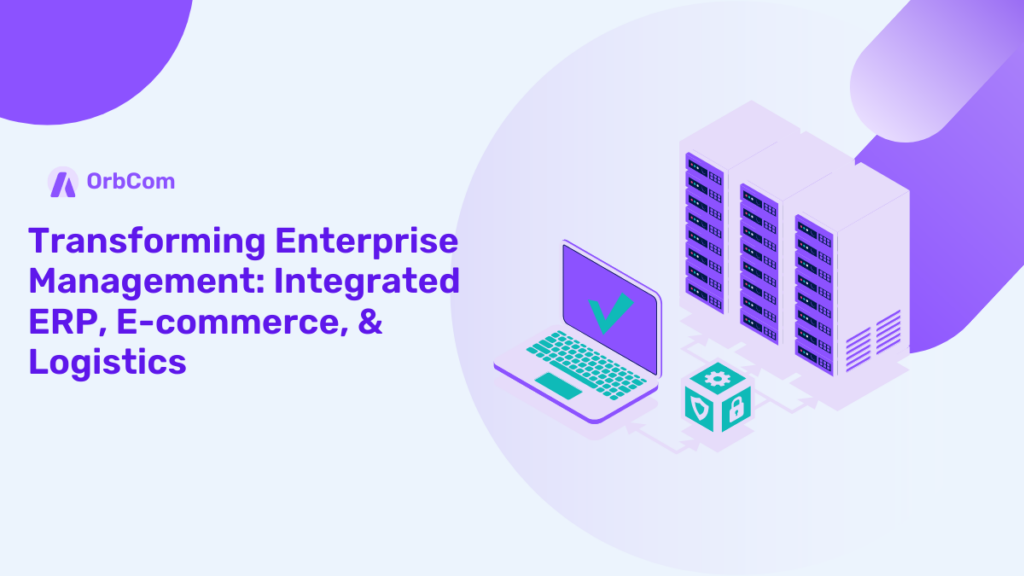
Transforming Enterprise Management: Integrated ERP, E-commerce, and Logistics Solutions
In today’s competitive business environment, enterprises need integrated solutions to manage diverse operations efficiently. This case study explores the development and implementation of a custom enterprise software solution for OrbCom, encompassing ERP, e-commerce, warehouse management, fleet management, and distribution management, supported by a robust backend and mobile applications.
✔︎ IT Advisory
✔︎ Digital Transformation
✔︎ Automation
✔︎ Cyber Security
✔︎ Custom Software
Problemt Statement
OrbCom, a large-scale enterprise with complex operational needs, sought to replace their fragmented systems with a unified platform. The goal was to streamline operations, enhance visibility, and support business growth. The client required a comprehensive solution to manage their entire supply chain, from procurement to delivery, along with strong e-commerce capabilities.
Challenges:
- Integrating diverse operations into a single, cohesive platform.
- Ensuring seamless data flow and real-time visibility across all departments.
- Developing user-friendly web and mobile interfaces for various stakeholders.
- Maintaining robust security and compliance with industry standards.
- Providing scalability to support future business expansion.
Solution
Enterprise Resource Planning (ERP):
- We developed a comprehensive ERP module to manage financials, human resources, procurement, and inventory.
- Real-time data analytics and reporting tools were integrated to provide actionable insights for decision-making.
E-commerce Integration:
- The solution included a fully-featured e-commerce platform, enabling the client to manage online sales, customer interactions, and marketing campaigns.
- Integration with the ERP system ensured real-time inventory updates and seamless order processing.
Warehouse Management:
- A robust warehouse management system (WMS) was implemented to optimize storage, inventory tracking, and order fulfillment.
- Features included barcode scanning, automated replenishment, and real-time inventory visibility.
Fleet Management:
- The fleet management module allowed for efficient scheduling, routing, and tracking of the client’s delivery vehicles.
- Real-time GPS tracking and maintenance scheduling ensured optimal fleet performance and reduced operational costs.
Distribution Management:
- The distribution management system streamlined logistics, ensuring timely and accurate deliveries.
- Features included route optimization, delivery scheduling, and real-time tracking of shipments.
Solid Backend Architecture:
- The backend was built using microservices architecture, ensuring scalability and flexibility.
- Technologies such as Node.js, Python, and PostgreSQL were used to ensure performance and reliability.
- APIs facilitated seamless integration with third-party systems and services.
Mobile Applications:
- Native mobile apps for iOS and Android were developed using Swift and Kotlin, respectively.
- Mobile apps provided field personnel with tools for inventory management, order processing, and delivery tracking.
- Offline capabilities ensured functionality even without internet connectivity.

The Results
- Streamlined Operations
- Enhanced Visibility
- Improved Customer Experience
- Optimized Logistics
- Scalability and Future-Readiness
- Through this robust solution, we enabled OrbCom to transform their operations, enhance customer satisfaction, and support business growth.
Tech Stacks We Used for the Proejct
Ready to innovate into the future?
Enabling Vision, Engineering Success: Your Future, Our Expertise
We’re happy to help you find your course and determine which of our services best fit your needs.
Your benefits:
- Goal-oriented
- Bespoke
- Cost Effective
- Time Efficient
- Risk Mitigation
- Transparent & Scalable
What happens next?
We Schedule a call at your convenience
We do a discovery and consulting meting
We prepare a proposal

